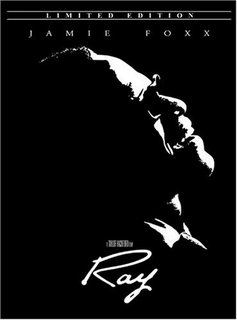 Ray, The Movie
Ray, The MovieAnvil Films, Baldwin entertainment, Bristol Bay Productions/Universal Pictures
Taylor Hackford, Director.
2004
The movie Ray, was released in 2004, shortly after the death of the its subject. Directed by Taylor Hackford, the movie was a 15-year labor of love that hinged, according to Hackford on Mr. Charles’ instincts regarding the actor to play him. Hackford stated in an interview that “[Charles] had the best instincts of anybody I've ever met.” Foxx emerged and the next year, the biopic won five Academy Awards, including a Best Actor nod to Jamie Foxx.
Criticism of the film was generally receptive if not enthusiastically so, but did occasionally v eer in the negative direction, as with Perry Seibert of All Movie characterizing Ray as:
…little more than a run-of-the mill biopic that hits all the familiar story points for that genre. What keeps this film from becoming totally pedestrian is the fierce, commanding performance of Jamie Foxx. This is not an impersonation of Ray Charles, nor is it a vain attempt to bask in the glow of Charles the celebrity. Foxx finds difficult emotional places to go to, and his Ray Charles is often more interesting than the one Hackford seems to want to tell the audience about. One can believe that these amazing songs are coming from this man, and that may be the biggest compliment one can pay to the performance.
Ouch! While that pretty well sums the up film, Ray offers many more treasures than tripe, particularly to the uninitiated public. The only danger here is where romanticism masks the reality. Ray certainly is not perfect a perfect film, but in its imperfection, it is better than 99% of its competitors. What is perfect about Ray is Jamie Foxx's performance. And the above description will be echoed later in this article.
The last film comparable as a vehicle for an individual performance was the adaptation of Manuel Puig's book Kiss of the Spider Woman (Hector Babenco, HB Filmes/Island Alive/Sugarloaf Films, 1985). In this film William Hurt plays the incarcerated homosexual pederast Luis Molina opposite the exquisite Raul Julia as the revolutionary Valentin Arregui. The roll was powerfully and convincingly portrayed and provided Hurt his Academy Award Best Actor win. However, I felt the film fell short in measuring up to Hurt's superb role, but that is no slight as the film remains uniformly fine. The very same summation is true for Ray. While both films are superb, they not sublime, as are the performances of their respective protagonist actors.
Ray, reveals the physical, emotional and intellectual development of Charles from a young child losing his sight, brother (to drowning, a loss Charles blamed himself for) and mother tragically in rural Florida in the 1930s to his appearance and performance of Hoagie Carmichael's "Georgia on My Mind" on the floor of the Georgia Legislature as the governor declared the piece State song of Georgia, April 24, 1979. When leaving the viewing, I noted several people in the audience commenting that the movie effectively ended 25 years ago. At first blush, it is a long stretch to be sure, leaving out the almost 25 years between then and now. Assuming they were pedestrian music listeners their criticism is justified, but in defense of Charles, perspective is warranted.
Ray Charles changed the face of American Music in almost as many ways as did Miles Davis over their respective long careers. Ray Charles is largely considered the originator of Soul Music, that bastard child of the blues, rock & roll, gospel that upset about every Christian churchgoer in the late 1950s. That, of course, was before Soul Music became a household phrase with the birth of Motown and Tamala Records out of Detroit, Stax records out of Memphis and Atlantic Records Southern Summer home in Muscle Shoals, Alabama. Plainly said, there would be no Aretha Franklin, Otis Redding, Wilson Pickett, Percy Sledge, Diana Ross, Temptations, and many, many more had there been no Ray Charles.
In the film, the meat of the matter begins with the storied owner and producer of the then independent Atlantic Records Ahmet Ertegun (Curtis Armstrong) approaching Charles after Atlantic had bought Charles' contract from Swingtime Records. After several recording sessions, Ertegun confronts Charles lack of originality for sounding to much like R&B singer Charles Brown. Ertegun suggests that Charles try a stride piano piece in the style of the boogie-woogie arpeggio with words composed by Ertegun. That resulted in the release of "The Mess Around" in the mid-1950s and Charles' first continental shift in American music.
Still not adequately finding his voice, Charles stepped out on a limb and proved to be the most significant musical alchemist in American musical history. He took the erotic and violent themes of the Blues and mixed them with the Gospel Trinity of rhythm, abandon, and pathos, releasing "I Got A Woman" in 1955, creating his second continental shift in popular music. By this time the famed producer Jerry Wexler (Richard Schiff) was in the picture and "I Got A Woman" was quickly followed by "Drown in My Own Tears," "Hallelujah I Love Her So," and "The Right Time" all gospel-inspired melodies inseminated with carnal secular themes. These songs were the mortar of the foundation of Soul Music.
Wooed away to ABC records in the late 1950s, Ray Charles became the first artist to strike a deal where he owned his own recording masters, a practice unheard of before Charles demanded it in his deal. In the film, this leads to a tense meeting with Wexler and Ertegun where Chares offers them the chance to match ABC's unmatchable deal. The former felt betrayed and the latter, proud of the accomplishments of Charles. While at ABC, Charles spun off another impressive string of hits that included, "Georgia on My Mind;" "Hit the Road, Jack;" and "Unchain My Heart."
In 1962, Charles took a major right turn, much to the chagrin of the ABC suits, and recorded the incredible Modern Sounds in Country and Western Music, his third continental American musical shift. Only Miles Davis had a larger influence on a musical genre. And that is pretty well where the movie ends regarding Ray Charles' influence on American music. That Charles did not shake the ground again after is Country Music recordings is of no matter. He didn’t have to; his legacy was secured.
In the film, the childhood scenes, flashbacks and similar devices are intended to (in a brief three hours) display the life circumstances that molded Charles with specific attention paid to his blindness and ultimate self-sufficiency, the death of his brother, his philandering, and 18-year heroin addiction, all against the backdrop of the musical history he was continually rewriting. It adds the necessary drama and romanticism to appeal to the audience who hold that important. Foxx brings this all off as with no effort.
The most compelling settings in the movie deal with those scenes showing Charles was installing the hinges of musical history, beginning with his improvement of Ahmet Ertegun’s “The Mess Around.” Next are the performances of “I Got a Woman” and “Hallelujah I Love Her So.” The true pinnacle scenes are where the singer is obligated with filling the final 20 minutes of a performance contract. Instructing his band to follow his lead, Charles turns to his Wurlitzer electric piano and begins to spin the gold thread of “What’d I Say.” The second pinnacle was the “Georgia on My Mind” recording session performed live with strings and choir. Foxx’s performance is most soulful here. Modern Sounds in Country and Western Music supplies the remainder of the soundtrack beginning with “I Can’t Stop Loving You” and ending with “Bye Bye Love.”
Of course, there are other fine performances in the film. The aforementioned Curtis Armstrong as Ahmet Ertegun and Richard Schiff as Jerry Wexler, introduce two titans in American music, responsible for recording the likes of Charles, Aretha Franklin, Dusty Springfield, Solomon Burke, Wilson Pickett, and the Soul list goes on. Bokeem Woodbine as David “Fathead” Newman paints a convincing picture of the great saxophonist and Chris Thomas King swaggers as bluesman Lowell Fulson. Regina King played Charles’ most compelling and sexy mistress Margie Hendricks, member of the original Raylettes and Sharon Warren who played well the long suffering wife of Charles, Aretha Robinson. Worthy of mention are the bit parts with Larenz Tate as a youthful Quincy Jones and Rick Gomez as the mythic Atlantic engineer Tom Dowd.
In the end, this is still Jamie Foxx’s film and so perfect is his performance, romantic or not, it cannot be denied.
 Unpredictable, Jamie Fox
Unpredictable, Jamie FoxJ-Records 72672, 2005
SIN: B000BPK2MK
Released December 20, 2005
Jamie Foxx, the man who is all things entertainment, is also quite a descent R&B singer. He certainly represents the progeny and inheritor of the mantle of Ray Charles. Jamie Foxx is indeed the legacy of the old Memphis/Stax/Atlantic/Muscle Shoals quadrangle. Mr. Foxx assembled a recording that stands straight up in the face of the substantial KanYe West (who appears on the recording) while at the same time blends Hip Hop and R&B better than any other act waxing (to employ an old term) today.
Unpredictable is a frankly sexual/sensual result of Hip Hop and R&B microparticles barreling ass at light speed around a 50 light-year cyclotron colliding and producing a new version of the past 50 years of African-American Music. It is his second recording; his first released in 1994 and well-received critically but was never commercial successful.
Ten years later, Foxx is an Academy Award Winning movie star who impressed the holy Clive Davis enough to be given a second record deal. Though Foxx didn't personally act as leader on any recording dates, he vowed to stay active in music working with Adina Howard, Gladys Knight, and Melvin Riley. Classically trained at Julliard, his musical prowess is one of the elements that won the trust of Ray Charles when that master was looking for an actor to perform his role in his biopic.
Foxx contributed to the soundtrack of the film Any Given Sunday and made a minor breakthrough on Twista and Kanye West's "Slow Jamz." Then like an atomic detonation, he became a superstar with his performance of the protagonist in Ray. Then came Unpredictable, his second solo album.
With a set of testicles the size of Mount Everest, Foxx claimed the dense production talent from Mike City, Timbaland, and Sean Garrett, along with guest spots from Twista, West, the Game, Ludacris, Common, Snoop Dogg, and Mary J. Blige to produce a best-selling recording. While he fits between R Kelly and Ginuwine, Mr. Foxx produces ample personality and talent to defend his music critics. He can ask for an amen with fervor Reverend James Cleveland and cry with the Soul of Otis Redding (or Ray Charles), but he is indeed superior when he's smooth. Therein lies my true criticism of the recording...less Hip Hop and more R&B and Jamie Foxx will produce the next "When a Man Loves a Woman."
© Copyright, C. Michael Bailey, 2006
